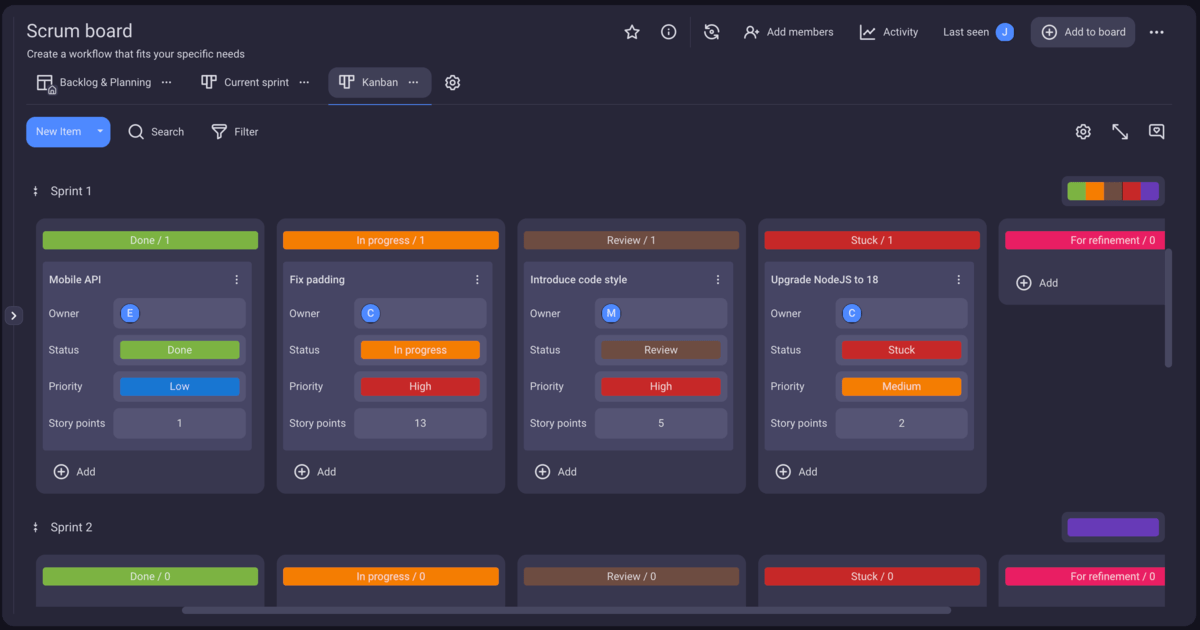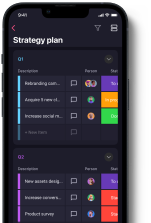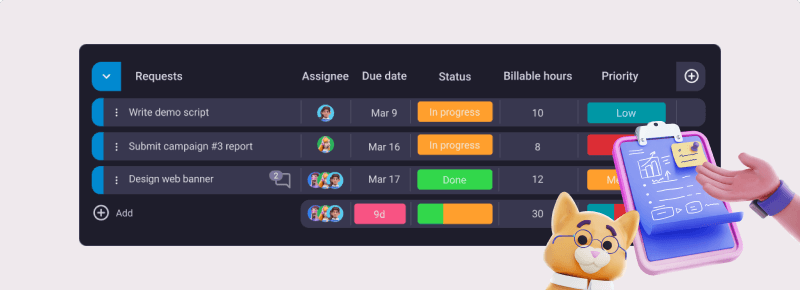A variety of factors contribute to the success of a project.
A successful project is one that meets the project plan requirements and is delivered on schedule and within budget.
But, one thing is certain — a project cannot be successful if it’s not managed effectively.
Still, to make sure that every aspect of a project is progressing as planned, project managers need help. That’s where a project coordinator takes the stage.
In this article, we’ll tackle the following questions:
- What is project coordination?
- Why is project coordination so important?
- How do project coordinators and project managers differ?
- What are the roles and requirements of a project coordinator?
- How can you improve your project coordination skills?
So, keep on reading and you’ll learn the ins and outs of project coordination.

Table of Contents
What is project coordination?
Project coordination refers to daily tasks that keep the project on the right track. It includes organizing and managing the workflow and helps projects develop as planned.
In addition, a project coordinator’s job is to make sure that all team members have everything they need to complete their tasks within the deadline.
They are also responsible for identifying potential issues that could interfere with the project schedule.
Since their duty is to steer the project towards its completion, they need to be familiar with all aspects of the project.
Project coordination vs. project management
Very often, people tend to confuse project coordination and project management. No wonder, since these two jobs have a lot in common.
In some companies, a project manager also works as a project coordinator. Still, in most cases these are two separate roles.
A project manager and a project coordinator work closely together and help each other.
Here is an overview of their main responsibilities:
| Project management | Project coordination |
|---|---|
| Planning a project | Monitoring project execution |
| Defining project development cycle (from initiation to completion) | Coordinating work during all phases of the cycle |
| Setting project goals | Monitoring daily tasks |
In a way, a project coordinator is an executive assistant to a project manager.
The project manager role bears more responsibility than that of a project coordinator. If a project fails, a project manager is considered primarily responsible for that.
On the other hand, if a project succeeds and even exceeds expectations, the largest share of the credit goes to them.
Still, a project coordinator is just a step behind a project manager. Moreover, it often happens that project coordinators become project managers at some point in their professional development.
💡 Plaky Pro Tip
If you are interested in becoming a project manager, check out these articles to learn what it takes:
Why is project coordination important?
Although a project is based on the ideas of a project manager, it doesn’t mean that a project coordinator role is less important — quite the opposite.
The work of a project coordinator is essential for putting to practice the idea behind the project.
Even the best project plan is doomed to failure if it’s not executed well. And, it’s the execution of the project that a project coordinator is responsible for.
If project tasks are not coordinated well, a project won’t be completed according to the plan.
A project coordinator makes sure that communication among team members is good and that each member does their share of work.
In addition, they also have to keep track of the expenses and identify potential problems that may affect the timeline.
Without project coordination, a project wouldn’t be able to develop and would remain just an abstract idea.
Responsibilities of a project coordinator
The roles and responsibilities of a project coordinator depend on the company they work for.
Still, there are some essential duties that every project coordinator has to perform, regardless of the type of business they work for.
Here are the most common responsibilities of a project coordinator.
Monitoring the progress of tasks on a daily basis
To ensure that everything is going as planned, project coordinators should monitor the work of each team member.
All employees have their specific tasks and responsibilities, and this way, they participate in the project completion. Therefore, project coordinators should make sure that everybody contributes their share of work to the final output.
In addition, project coordinators should regularly check if team members have all the resources they need for their tasks.
Communicating with employees, managers, and stakeholders
Project coordinators should promote good communication among team members. They should also facilitate communication between the project manager and stakeholders in all phases of the project life cycle.
They should inform the team about how the project is progressing and share with them important updates and unexpected modifications.
Project coordinators need to constantly inform their managers of day-to-day changes in project development. They should also be in touch with clients and intervene in case there are any misunderstandings.
💡 Plaky Pro Tip
If you want to know more about the importance of communication in project management, take a look at this article:
Planning and organizing meetings
Project coordinators are responsible for organizing meetings with both team members and external stakeholders. For instance, when a certain milestone is reached or a major change occurs, a project coordinator needs to organize meetings to update everyone concerned.
Preparing and managing documentation
Documenting project information is of great importance for a project’s successful development. Therefore, project coordinators are also responsible for preparing and taking care of various documents, such as invoices and contracts.
Their responsibilities sometimes include creating a project status report to inform the project manager and stakeholders about the project’s progress.
Project coordinators also deal with other administrative tasks, such as billing and bookkeeping.
During all kinds of meetings, project coordinators should take notes and distribute these meeting minutes to all project team members.
Coordinating the project schedule, budget, and risks
Project coordinators assist project managers in allocating resources so that team members can complete their tasks on time.
Overseeing the daily work of employees helps project coordinators identify potential issues and risks. This way, they help prevent project failure and additional expenses.
A project consists of many tasks, each with its own due date. If any of these tasks falls behind schedule, it influences the timeline of the entire project. That is why it’s important for project coordinators to keep track of how each task is progressing and to react on time.
6 Tips for improving your project coordination skills
Being a good project coordinator is based on how well you apply certain skills to your day-to-day tasks. Therefore, it is extremely important that you constantly work on your proficiency.
By implementing some tips and tricks, you will bring these skills to perfection.
Take a look at how you can master them.
Tip #1: Maintain good communication
As stated in the Forbes article, poor communication is one of the leading causes of project failure.
So, good communication among team members is extremely important for a successful project.
Project coordination requires communication on a daily basis.
As a project coordinator, you need to constantly be in contact with stakeholders and managers and update them on any changes. Additionally, you are in contact with team members by assigning tasks to them and updating them on changes.
To get your message through, you should know how to express yourself. That is why it’s of utmost importance that you constantly improve your communication skills — both written and oral.
To be able to understand your team, you have to get to know each team member.
Get familiar with their abilities and their strong and weak points. That will help you estimate the output you can expect of each of them and the time they will need for particular tasks.
You should talk to your team about your expectations and let them share theirs with you. Also, you should model and encourage transparency to help your team trust you and turn to you in case of any questions or misunderstandings.
It is also essential that you foster teamwork and collaboration among team members. Show your team that you value their contributions and encourage them to share their ideas with you.
Tip #2: Make good use of your time
As a project coordinator, chances are you are often pressed for time. You have so much work on your plate on a daily basis, so knowing how to divide your time is crucial.
Try not to waste time on tasks that are not urgent and save it for those that require your immediate attention.
For instance, you are in charge of holding weekly meetings with your team to update them on any changes.
However, sometimes there aren’t many changes worth mentioning, so it’s your chance to save time by skipping that meeting.
Instead, you can share that information in some other meeting when there will be more material to present. Alternatively, you can write a short report and email it to your team members.
💡 Plaky Pro Tip
For better organization of your time, you should pick an organization app that fits your needs:
Tip #3: Work on problem solving
Problem solving is one of the responsibilities that a project coordinator often grapples with.
Of course, you can always consult a project manager regarding some serious problems. However, when it comes to minor issues that your team members report to you, it’s your responsibility to find a solution.
Therefore, you should always think of new problem solving strategies, but also learn from past experience.
One of your key responsibilities as a project coordinator is assisting the project manager in tracking risk. Thus, you should always be aware of potential risks that may affect the project’s success.
A project coordinator should support the project manager in implementing risk management strategies to avoid these risks or eliminate their negative effects.
Tip #4: Stay organized
As a project coordinator, you need to keep work on schedule.
Therefore, you should monitor the progress of every task and pay attention to the project timeline. Also, you should track the project budget and make sure that resources are used as planned.
This demands being perfectly organized and having all the necessary documents at your fingertips at any time.
One of the best ways to stay organized at work as a manager and have all information in a single place is to use project managing software.
In Plaky, for instance, you can keep track of your team’s progress and have all your documents organized.
You can easily assign tasks to team members and add due dates for every task.
Also, you can switch to Kanban view and thus sort tasks according to their status – To Do, In progress, Review, or Done.
This way, you will always be informed about the progress of each task and be able to identify potential problems.

Project management tools also help you maintain good communication with team members. You can keep everyone updated and share information with a few clicks.

💡 Plaky Pro Tip
Discover all the options that Plaky offers to help you coordinate a team of workers and easily organize your tasks:
Tip #5: Acquire new knowledge and skills
Being a project coordinator, you should constantly learn new things.
Let every positive or negative experience teach you something new.
Apart from learning from experience, you can also learn from your colleagues. For instance, you can seek feedback from a project manager and ask them to give you advice on what to work on.
Another option for learning something new is taking on a task you’ve never worked on before. This way, you will be able to develop new abilities and skills.
In addition, you should attend workshops or enroll in a course. This is your opportunity to either learn something totally new or expand your knowledge and improve your skills.
Tip #6: Promote positive attitude
Staying positive and optimistic makes it easier for you to cope with unexpected project challenges.
By maintaining a positive attitude, you can help your team members stay motivated.
Therefore, you should always strive for staying optimistic in any situation. Looking at the bright side can help you move on and learn from your mistakes.
Remember that you are responsible for boosting the morale of your team and that encouragement is conducive to productivity.
Conclusion: Project coordination helps keep project work under control
Project coordination refers to managing day-to-day tasks within a project and making sure that the project is progressing according to the timeline and within the budget.
It also involves monitoring all aspects of a project and anticipating potential risks.
Project coordinators are also responsible for holding various meetings with team members and stakeholders to inform them about changes.
In addition, they are responsible for motivating team members and nurturing their enthusiasm.
Such responsibilities call for a wide range of skills:
- Communication,
- Organization,
- Problem solving,
- Time management, etc.
When mastered, these skills can help streamline project work from planning to execution and delivery.
Additionally, the work of project coordinators is hard to imagine nowadays without the assistance of project management software.
With the help of these tools, tasks that would otherwise take hours to complete are reduced to just a few clicks.
✉️ Have you tried out some of these tips? Do you have any project coordination experience to share with us? Let us know at blogfeedback@plaky.com and we may include it in this or in some future article. Also, if you liked this post and found it useful, share it with someone who would also benefit from it!







